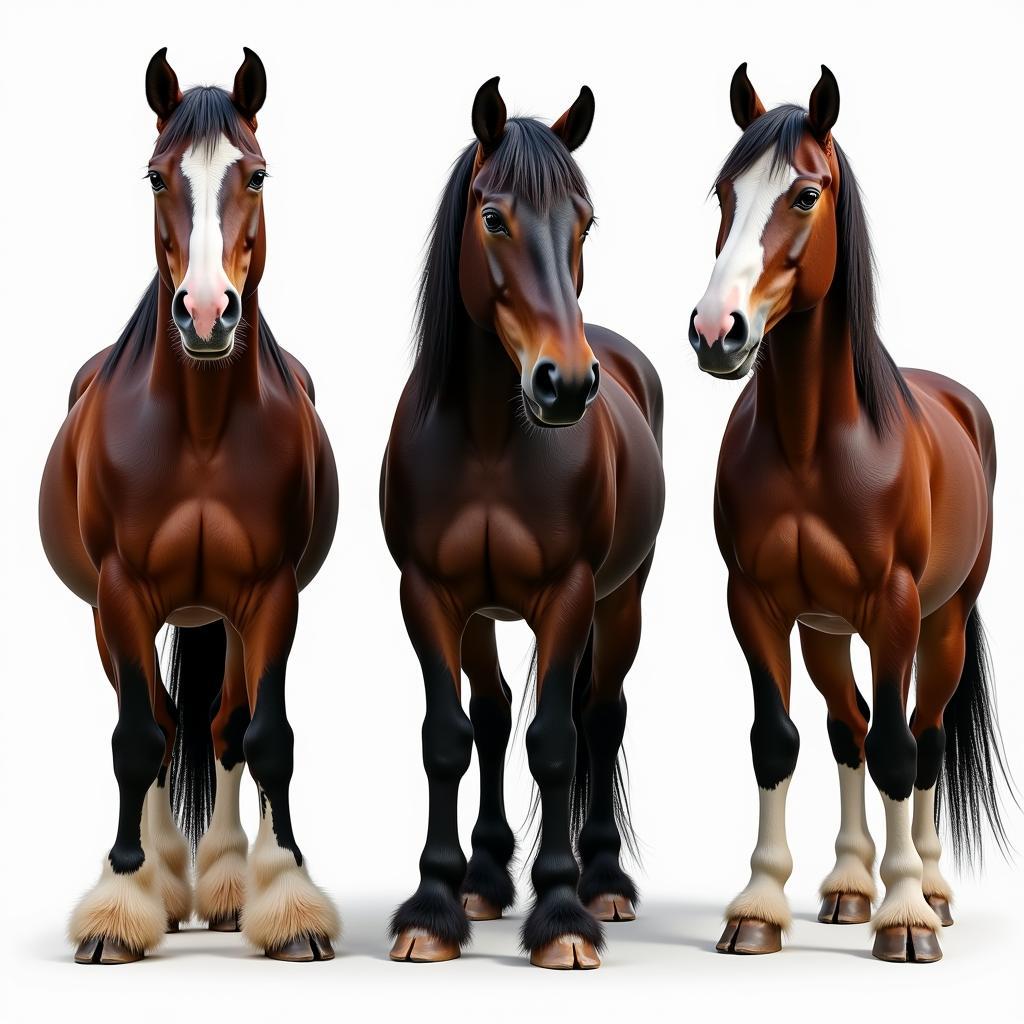Large Breed Horses command attention with their impressive size and strength. They are a popular choice for various disciplines, from leisurely trail riding to competitive driving. This guide explores the world of large breed horses, covering their characteristics, care requirements, and suitable disciplines. We’ll delve into popular breeds, common health concerns, and tips for choosing the right large breed horse for you.
Defining “Large Breed Horse”: What Qualifies as Big?
While there’s no strict definition, horses typically considered “large breeds” stand over 16 hands high. This translates to 64 inches or 1.63 meters measured from the ground to the highest point of the withers. Some breeds consistently produce individuals well over 17 hands, earning them the title of “giant horse breeds.”  Comparing Large Horse Breeds: Shire, Clydesdale, Percheron
Comparing Large Horse Breeds: Shire, Clydesdale, Percheron
Popular Large Breed Horses: From Gentle Giants to Powerful Athletes
Several breeds are renowned for their size and strength. These include:
- Shire: Known for their feathered legs and immense size, Shires are true gentle giants.
- Clydesdale: Similar to Shires, Clydesdales also sport feathered legs and are often seen pulling carriages.
- Percheron: These powerful horses excel in both draft work and riding disciplines.
- Belgian: Belgians are known for their muscular build and calm temperament.
Caring for Large Breed Horses: Addressing Their Unique Needs
Owning a large breed horse presents unique challenges and rewards. Their size necessitates larger stalls, more feed, and specialized tack. Here are some key considerations:
- Nutrition: Large breeds require a balanced diet with ample forage and carefully portioned concentrates.
- Housing: Spacious stalls and paddocks are essential to accommodate their size and ensure their comfort.
- Health: Regular veterinary checkups are crucial to monitor for breed-specific health issues.
Remember, finding the right large horse breeds for riding requires careful consideration of your experience and riding style.
Choosing the Right Large Breed Horse: Matching Your Needs and Experience
Selecting a large breed horse requires careful consideration. What are your riding goals? Do you prefer a calm temperament or a more spirited horse? Consider these questions:
- Experience Level: Are you a beginner, intermediate, or advanced rider?
- Discipline: What type of riding do you enjoy – trail riding, dressage, or something else?
- Temperament: Do you prefer a laid-back horse or one with more energy?
Choosing personalized horse trailer decals can be a fun way to showcase your unique style and your love for your large breed horse.
Common Health Concerns in Large Breed Horses
Large breeds are prone to certain health issues, including:
- Joint problems: Their size puts extra stress on their joints, making them susceptible to arthritis and other conditions.
- Laminitis: This painful hoof condition can be triggered by various factors, including obesity and metabolic issues.
- Shivers: This neurological disorder affects the hind limbs and can impair movement.
A well-designed western horse barn is essential to provide a comfortable and safe environment for your horse, particularly during inclement weather, to help prevent some of these health concerns.
Conclusion: Embracing the Majesty of Large Breed Horses
Large breed horses offer a unique riding experience, combining power and grace. By understanding their specific needs and providing appropriate care, you can enjoy a rewarding partnership with these magnificent animals. Large breed horses are a significant commitment, but the bond you forge will be invaluable. Remember to consider your horse in stall requirements to ensure they have a comfortable and safe space.
FAQ
- What is the average lifespan of a large breed horse? Typically, 20-25 years.
- How much do large breed horses eat? They consume significantly more feed than smaller breeds, often requiring specialized diets.
- Are large breed horses suitable for beginners? Some are known for their gentle nature, while others are more suitable for experienced riders.
- What are the common health issues in large breed horses? Joint problems, laminitis, and shivers are more prevalent in these breeds.
- How much space do large breed horses need? They require larger stalls and paddocks than smaller breeds to ensure comfort and prevent injury.
- What are the costs associated with owning a large breed horse? Expect higher costs for feed, bedding, veterinary care, and farrier services compared to smaller breeds.
- Where can I find reputable breeders of large breed horses? Consult breed registries and organizations for referrals to reputable breeders in your area.
Having a unique vintage ceramic horse head lamp can add a touch of character to your stable and show your appreciation for these magnificent animals.
For further assistance, contact us at Phone Number: 0772127271, Email: [email protected] Or visit us at QGM2+WX2, Vị Trung, Vị Thuỷ, Hậu Giang, Việt Nam. We have a 24/7 customer service team.